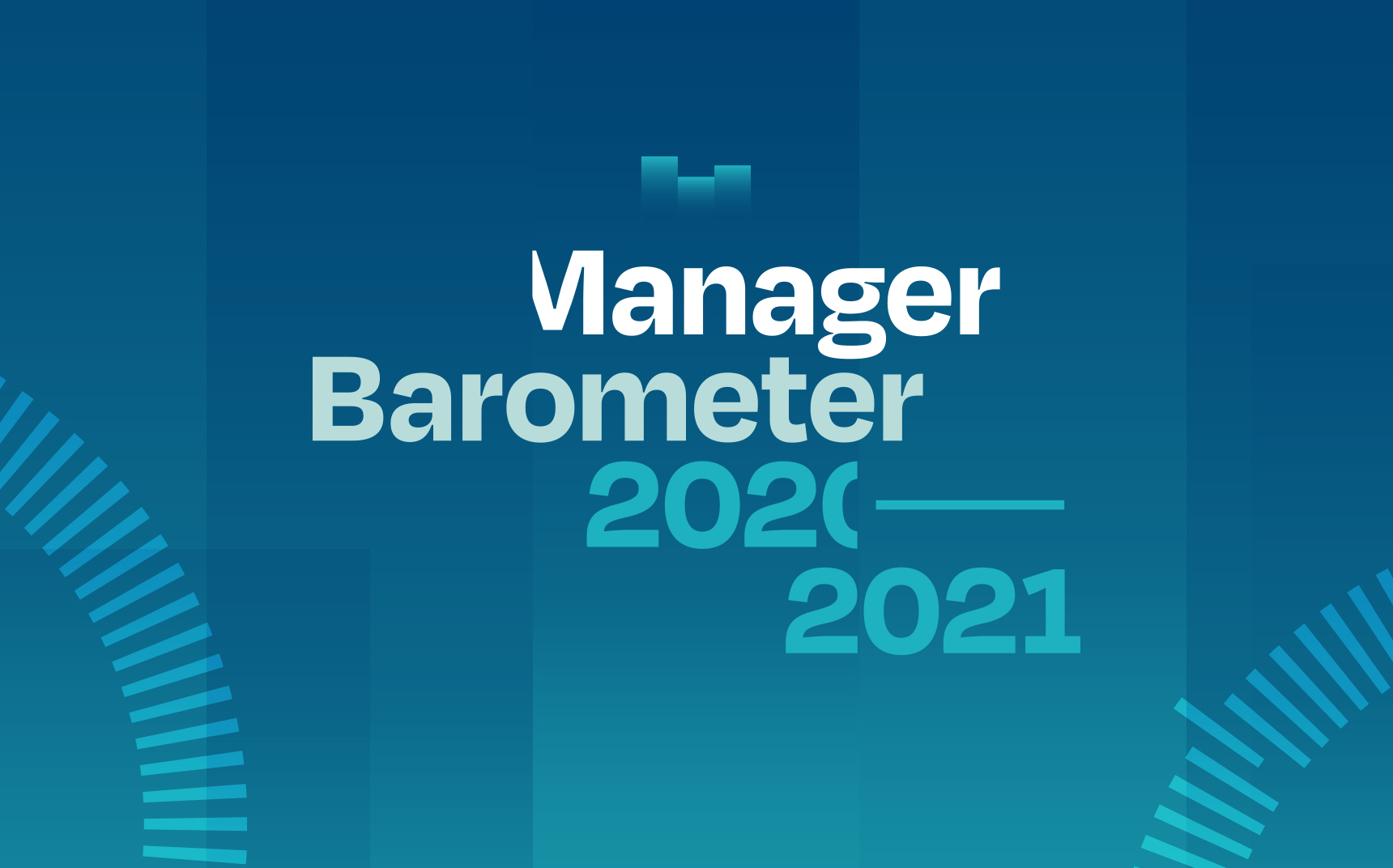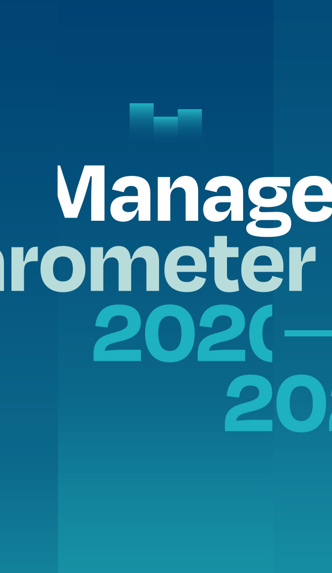Exploring new ways of working, sustainability, purpose, and what’s really driving today’s German-speaking manager.
The tenth annual Odgers Berndtson Manager Barometer survey of over 2000 executive managers across Germany, Austria and Switzerland, came after undoubtedly the most disruptive period in our modern working life.
How has the impact of Covid-19 changed attitudes to managers’ careers and motivations? What new priorities emerged in one of the most comprehensive surveys of executives in the German-speaking world? What does that mean for talent management and leadership in the post-Covid era?
Our Manager Barometer 2020 survey: exploring the mind and motivations of the modern manager
The tenth annual Odgers Berndtson Manager Barometer survey of over 2000 executive managers across Germany, Austria and Switzerland, came after undoubtedly the most disruptive period in our modern working life.
Download nowFeeling more remote
Beginning with the subject of lockdown working, we saw some recent changes in the attitudes of managers when compared to the quick COVID-focused survey we did in May. As the lockdown conditions have evolved to more of a hybrid situation, managers are now more adjusted to working remotely, finding a balance between family life and working, for instance. But they are definitely feeling the absence of in-the-office social contact and are finding it more difficult to find motivation working ‘solo’.
Looking forward, managers feel that many of the changes and innovations experienced in reaction to the Covid crisis will continue to accelerate with restructures expected. To deal with this world of change, fully 71% of managers expect that they will require completely different skills to cope.
What is my purpose? An important question.
Perhaps the most significant finding in the 2020 Manager Barometer is the rise of personal and corporate purpose as a factor in making career choices. Increasing numbers of managers and employees are asking questions about the sense of purpose of their own actions and that of the company they work for. It is, indeed, the second-most important motivation for managers surveyed.
We believe this change has been accelerated by the ongoing Covid crisis. It’s certainly emerged as a major factor in the minds of managers when choosing an employer.
Similarly, for companies seeking to attract, retain and inspire good employees (especially the younger generations) in a tight skills market, ‘purpose’ cannot be ignored.
A clear standout on the importance of purpose is the medical/pharmaceutical/chemical industry with a much higher score than any other economic sector. (Read more about purpose in Life Sciences here.)
A generation gap emerges in motivations
Unchanged by recent events, and still just as important for the managers we surveyed, is being able to use your personal strengths and talents in the workplace. This is still the number one career motivator. For Generation Y managers, it is even more important. However, they are increasingly less motivated to participate and assume greater managerial responsibility. For them, there has been a sharp decline in any motivations beyond their own personal wellbeing. They aren’t driven by the ‘joy’ of leadership, or involvement in change at innovative companies. Nor does the opportunity to exert influence and have the chance to actively shape things raise their interest.
Career ambitions remain
What is striking in this year's study is that managers' career ambitions remain high, despite the Corona crisis. Over 60% of the participants in our survey want to continue to achieve the maximum in their career. However, their openness to deal with new challenges is declining, 50% this year, versus over 60% of managers last year. Perhaps this is another consequence of the barrage of changes and challenges caused by the Corona crisis.
Coupled with continued career ambition is the managers’ willingness to change jobs. More than half of all managers are willing to do so.
But there are differences between sectors. Managers in the automotive, telecommunications/technology, consumer goods and industrial sectors are happiest to move. Many of these are "old" industries with high levels of structural change and uncertain long-term prospects, so thinking of moving on is not entirely surprising.
This is in contrast to sectors like medical/pharmaceutical/chemical, financial services, management consulting/auditing, public services and energy utilities. All these sectors offer a more positive long-term outlook for their more-settled managers.
Sustainability enters the reckoning
For the first time, our Manager Barometer explored sustainability, and the results were revealing. In six out of ten companies, we found that it is very important. That commitment to sustainability is distributed relatively evenly among the classic ESG model: environment, social affairs and sustainable corporate governance.
There is still some work to do though, on implementing those sustainability goals. For example, sustainability targets are part of the effective business strategy of only about half of all companies. And in less than half of the companies, management lives up to its function as a role model or commits itself to meeting sustainability targets.
The increasing impact of agile
Digital innovation has long since arrived in companies, and it has introduced new, more agile methods of project management.
We were surprised by the enthusiasm for the theme "Agile Leadership" that we found among the participants.
Three-quarters of managers consider agile leadership methods to be useful and positive.
Around 60% confirm their companies are already using them. For a young topic like agile leadership, this is an enormous impact.
Agility, however, requires not only the application of methods, but also a profound cultural change in the companies. The results of our study show that companies are on the right track here, with managers across all industries actively involved in the implementation of agile methods.
What comes next?
To see how our Manager Barometer findings might play out more into the future, especially around the emergence and importance of purpose in a world with greater long-distance collaborations, we worked with The LeadershipGarage.
They conduct research on digital collaboration, digital leadership and digital performance and, ultimately, develop innovative solutions for leading, working and learning in the digital world.
The events of the past year have shown that effective collaboration at a distance is becoming increasingly important for companies and organisations.
If personal work meetings are not possible in times of crisis, the success of collaboration is based not only on acceptable conditions of the personal work situation and individual planning and self-management skills, but also to a large extent on the awareness of important common intentions, goals and values: the all-important purpose.
“With strong indications that there will be no complete return to earlier forms of work, leadership and cooperation at a distance will become a stronger part of corporate work in the long term, concludes Silvia Eggenweiler, Author of the Odgers Berndtson Manager Barometer 2020.
This raises many questions which are answered in the report. How exactly does a "shared purpose" influence collaboration? How do managers and employees perceive its influence on the changed collaboration? What effect does purpose have on the success of the company? How is digital performance changing and how is it influenced by the common purpose?
To read their analysis and find out more about the issues that are motivating managers and how it might impacts on your talent and leadership strategies, download our report now.




